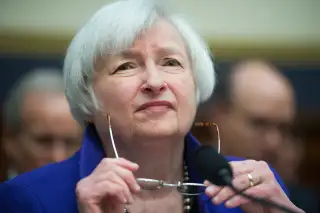What President Trump Means for Interest Rates -- and Janet Yellen's Job

Donald Trump won't assume power for another 70 days or so, but the bond market is already taking notice.
Ten-year Treasury yields have shot up from 1.8% before the vote to 2.1% — the highest level in nearly a year, after initially dropping like a stone in after-hours trading after Tuesday's election results started rolling in.
Fixed income yields move in the opposite direction of bond prices. So rising yields means that investors are selling bonds fast. A lot of that money appears to be heading into the stock market, as the Dow jumped 127 points in early trading today, and gained 250 points yesterday.
Why are bond investors selling in the era of Trump?
After years of low borrowing costs and price gains thanks to the Great Recession and the economy's subsequent slow, if steady, growth, investors seem to believe that there's a New World Order.
They believe Trump's victory, coupled with his party's control over both houses of Congress, will usher in an era of increased spending on infrastructure, unprecedented tax cuts, and protectionist trade policies — all of which will lead to increased inflation.
And because fixed income returns are relatively modest, bonds suffer more than stocks when inflation rises.
For instance in the five years from 1977 to 1981, intermediate-term government bonds returned 4.4% while inflation averaged 10.1%, according to the 2016 SBBI yearbook. That means the annual real rate of return for investors was -5.7% during that stretch, a devastating outcome especially for retirees.
Why will Trump's policies lead to higher inflation?
Right now the economy is actually pretty strong and close to what economists term the "full employment" phase. The nation's gross domestic product rose 2.9% in the third quarter of 2016, and the unemployment rate has hovered around 5% for most of the year.
A massive increase in fiscal spending to rebuild roads, bridges, and airports, combined with vast deficit-spending in the form of a tax cut, may lead to more money swirling around an already relatively health economy.
When you are hiring new workers into an already tight labor market, employers have to pay more to attract talent, which will result in higher prices across the board, and increased inflation.
“The more you push job growth, the more you push wage growth,” says Tim Hopper, chief economist for TIAA Global Asset Management. And the more wages grow, the more likely inflation is likely to heat up.
If you include Trump's threat to impose a new tariffs on Chinese and Mexican goods, the cost of goods that Americans buy at Wal-Mart and Costco could rise by about 3%, according Moody's Analytics, who predicts Trump's proposals could lead to a recession in two years.
What does this mean for the Fed?
Before Trump's victory, inflation was already on the rise, with consumer prices forecast to grow 2.3%, nearly double this year’s pace, according to the Blue Chip Economic Indicators survey.
Even higher inflationary pressures typically bring on expectations of Federal Reserve interest hikes.
Enter Fed chair Janet Yellen.
Before the election, most economists expected two quarter-point hikes in short-term interest rates by the Federal Reserve in 2017.
Trump’s election could speed up or slow the pace — depending on whether his economic policy prescriptions lead to greater uncertainty in the financial markets. But a couple of modest hikes is still a reasonable expectation.
"We do not believe the election results have changed the Fed’s outlook," says Burt White, chief investment officer at LPL Financial.
Ed Yardeni, chief investment strategist of Yardeni Research, says Yellen's "gradual approach to normalizing monetary policy would enable the Trump administration to fund a massive infrastructure spending program at relatively low rates." He added: "If the fiscal stimulus pushes bond yields up too much, Trump might actually ask Yellen for some helicopter money.”
An economic advisor to Trump told the Wall Street Journal that the President-elect was not planning to push for Yellen's resignation, but the relationship between arguably the two most powerful people in the world may define Trump's term.
Markets indicate there's a 75% chance that the Fed raises short-term rates modestly when policy makers meet in mid December.